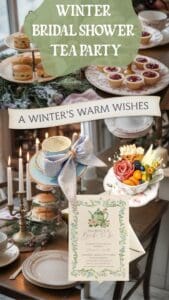Planning a wedding can be a whirlwind of excitement and stress, and if you’re envisioning a magical winter wedding, the stakes can feel even higher.
Winter weddings have a unique charm with their cozy vibes and beautiful snowy backdrops, but they also come with their own set of challenges.
To help you navigate this chilly terrain, we’ve put together a list of the top seven mistakes couples often make when planning a winter wedding.
Avoid these pitfalls to ensure your day is as perfect as a fresh snowfall.
I want to be clear, winter wedding are probably my favourite. So these mistakes are not here to put you off but help guide you to not only have a stunning winter wedding but a stress free one also. Let’s dive in!
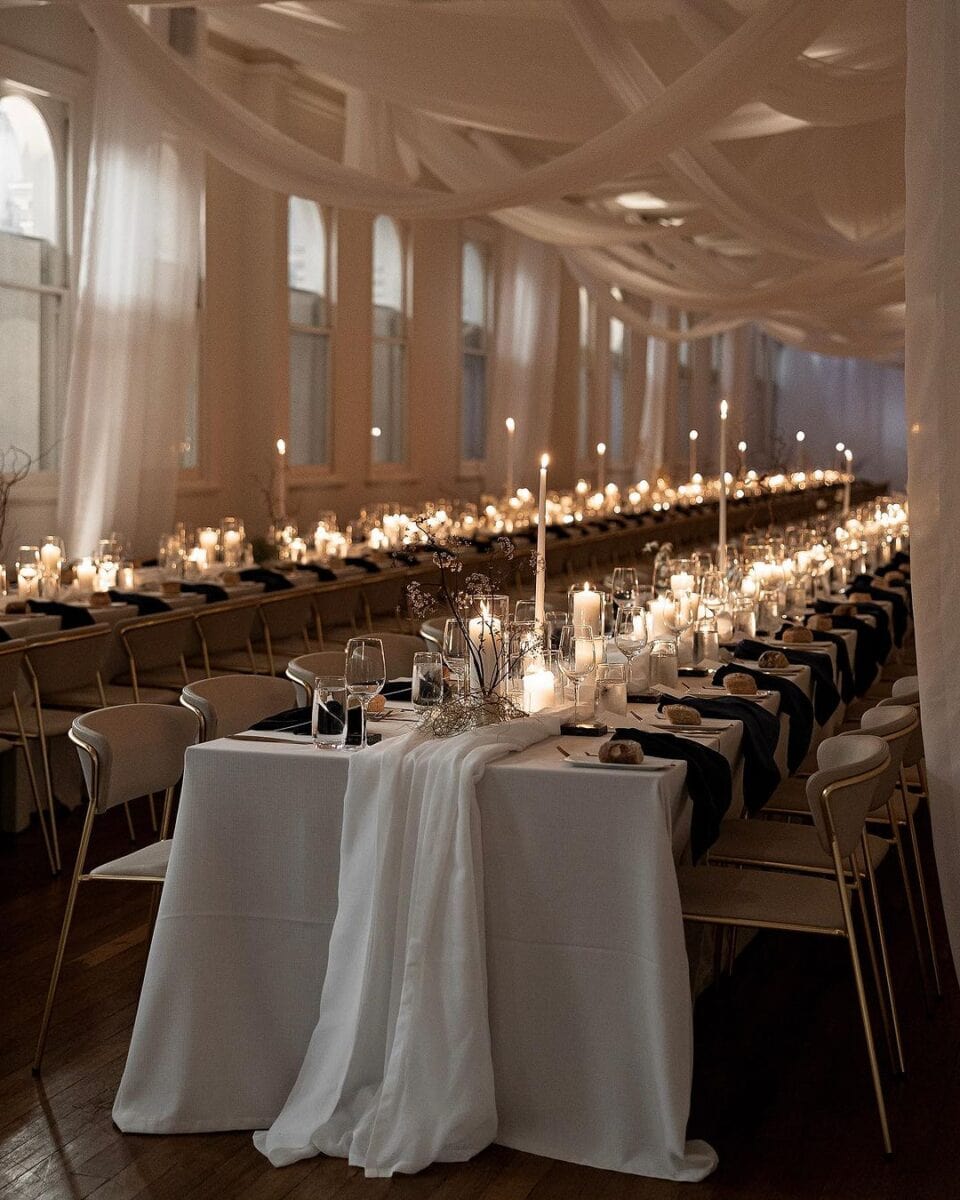
The 7 most common mistakes couples make when planning a winter wedding
Don’t underestimate the extra planning that goes into a winter wedding. You need to think about the weather, guests transport and needs, styling and décor is different in winter.
The holidays will affect so much from guests out of town to vendors charging more flowers and other décor being available. below are some of the most common mistakes I have seen and heard about while working in the wedding industry.
1. Underestimating Weather Preparation
Winter weather can be unpredictable, and failing to plan for it can throw a wrench into even the best-laid wedding plans.
Here’s how to ensure your guests are comfortable and everything runs smoothly, no matter what Mother Nature has in store:
Keep Guests Informed
- Weather Updates: Regularly update your guests on the expected weather leading up to your wedding day. Include this information on your wedding website or send periodic email updates.
- Dress Code Suggestions: Recommend appropriate attire for the season, such as warm coats, gloves, and scarves. Consider providing a note in your invitations about the expected weather and any special preparations guests should make.
Provide Essential Amenities
- Heaters and Blankets: If any part of your wedding will be held outdoors, ensure there are enough heaters to keep everyone warm. Place blankets on each chair or have a cozy blanket station where guests can grab one if they’re feeling cold.
- Hot Drinks: Hot beverages like coffee, tea, hot chocolate, or even hot toddies can help keep your guests warm. Set up a hot drink station or have servers circulate with warm drinks during outdoor moments.
Prepare an Emergency Kit
- Hand Warmers and Tissues: Include items like hand warmers, tissues for runny noses, and even lip balm to combat dry, cold air. These little touches can make a big difference in guest comfort.
- Extra Shoes: Have an extra pair of shoes for both the bride and groom and consider suggesting the same to the bridal party. This is especially important if your primary footwear isn’t suited for snow or icy conditions.
Transportation Considerations
- Guest Transport: Arrange shuttle services to transport guests to and from the venue if the weather is bad. This can prevent delays and ensure everyone arrives safely.
- Supplier Transport: Confirm that all your suppliers (caterers, photographers, florists, etc.) have contingency plans for bad weather. Ensure they know the best routes to your venue and have extra time built into their schedules for potential delays.
Flexible Indoor/Outdoor Plans
- Indoor Backup: If you’re planning an outdoor ceremony or reception, always have an indoor backup ready to go. Make sure your indoor option is just as beautiful and suitable for photos as your outdoor plan.
- Seamless Transitions: Set up indoor spaces that can be easily accessed by guests if the weather changes suddenly. This could be a lounge area with heaters, cozy seating, and warm décor to make the transition seamless and comfortable.
Vendor Communication
- Weather Contingency: Discuss weather contingency plans with all your vendors well in advance. Ensure they have backup plans and know exactly how to handle any last-minute changes.
- Timing Adjustments: If bad weather is predicted, consider adjusting the timing of your events. For instance, you might want to start the ceremony earlier in the day to make the most of daylight hours.
Venue Preparations
- Clear Pathways: Ensure that pathways to and from the venue are clear of snow and ice. This might mean hiring extra help to keep walkways salted and safe throughout the day.
- Parking Plans: Make sure there is ample parking available and that it’s easily accessible despite the weather. Consider valet services to help guests avoid walking long distances in the cold.
By thoroughly preparing for the winter weather, you can ensure that your wedding day is not only beautiful but also comfortable and safe for everyone involved.
Embrace the season’s challenges with these thoughtful tips, and your guests will appreciate the extra care and consideration.
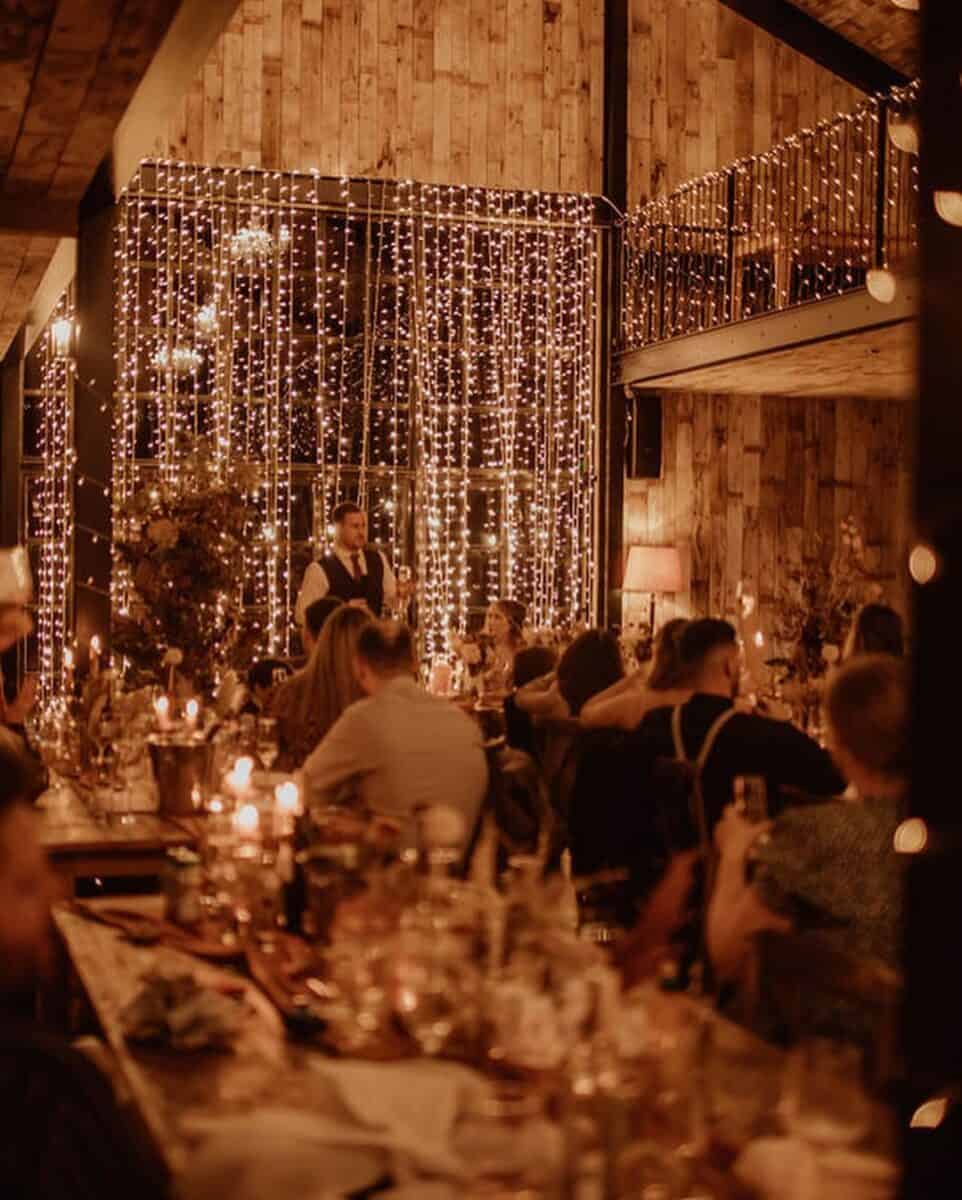
2. Not Having a Backup Plan
This is a huge one, it surprised me how many couples I worked with did not have a few plans in place in case anything should go wrong.
A backup plan is crucial for winter weddings. The unpredictable nature of winter weather can lead to unexpected challenges, from severe snowstorms to icy conditions.
Here’s how to ensure your wedding day proceeds smoothly, regardless of the weather:
Indoor and Outdoor Venue Options
- Indoor Backup: Always have an indoor venue option ready if planning an outdoor element. This means booking a space that can accommodate all your guests comfortably and can be decorated to match your wedding theme. Ensure this space is accessible and prepared to host the ceremony and reception if needed.
- Dual Setup: If your heart is set on an outdoor wedding, consider setting up both indoor and outdoor venues. This can be costly but provides peace of mind. Coordinate with your venue and vendors to ensure both spaces are equally beautiful and functional.
- Decision Timing: Decide in advance when the final call will be made to switch to the indoor option. Typically, this should be no later than the morning of the wedding. Assign a trusted person (like your wedding planner or a family member) to make this decision based on the latest weather forecast.
Logistics and Coordination
- Vendor Communication: Ensure all vendors are aware of the backup plan. Discuss in detail how the transition will work and who will be responsible for moving any equipment, decorations, and seating. This might involve extra fees, so plan your budget accordingly.
- Guest Notification: Inform your guests about the possibility of an indoor backup plan. Include details in your invitations or on your wedding website, and ensure that guests know where to go if the weather forces a change.
Flexibility in Timeline
- Adjustable Schedule: Build flexibility into your wedding day timeline to accommodate potential delays. This might mean scheduling extra time between events or planning for a slightly earlier start to ensure daylight for photos.
- Transport Contingencies: Arrange for shuttles or other transportation options to ensure guests can travel safely between locations, especially if the weather takes a turn for the worse.
Health and Safety Considerations
- Guest Health: Winter is flu season, and inclement weather can cause additional health risks. Be prepared for the possibility that some guests may cancel at the last minute due to illness or travel issues. Have a plan for adjusting seating arrangements and catering numbers accordingly.
- Safety Measures: Ensure that all walkways and parking areas are cleared of snow and ice. Provide adequate lighting and heating for all areas guests will use, whether indoor or outdoor.
Additional Preparations
- Decor and Setup: Have a plan for transferring decorations and settings between venues quickly and efficiently. This might involve a team dedicated to this task, so everything is ready no matter where the event takes place.
- Entertainment and Activities: Prepare for indoor entertainment options in case outdoor activities are canceled. This could include a photo booth, indoor games, or a cozy lounge area with warm drinks and snacks.
Communication is Key
- Keep Guests Informed: Use your wedding website, social media, or email to keep guests updated on any changes. Clear communication ensures everyone knows what to expect and can adjust their plans accordingly.
- Vendor Coordination: Regularly check in with your vendors to ensure everyone is on the same page regarding the backup plan. A well-coordinated team will make the transition smoother and less stressful.
By having a comprehensive backup plan, you can ensure that your winter wedding is beautiful, memorable, and free from the stress of last-minute weather disruptions.
Preparing for the worst while hoping for the best will help you and your guests enjoy the day, no matter what the weather brings.
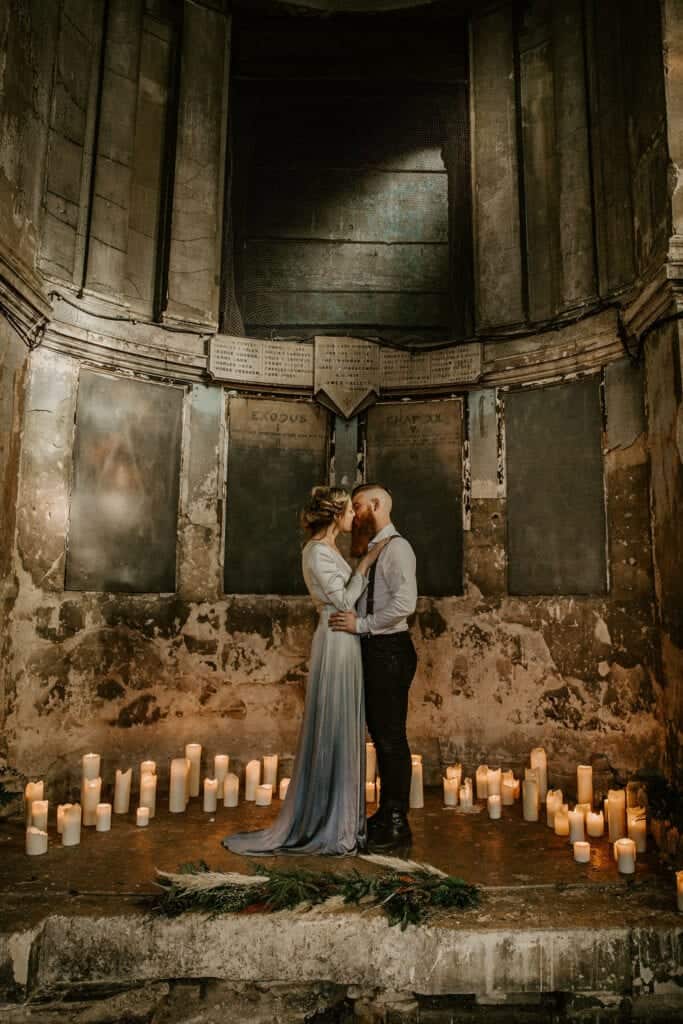
3. Not scheduling for shorter days
Winter days are shorter, which means less natural light for your wedding photos. If you want that moody feel or a candlelit wedding ceremony then a later start is perfect but do remember unless you have photos first you won’t get daylight images.
Properly planning your ceremony and photography sessions is crucial to making the most of the available daylight. Here’s how to ensure you capture stunning photos even with limited sunlight:
Plan the Ceremony and Photography Schedule
- Early Start: Consider starting your ceremony earlier in the day to maximize the available daylight. This is especially important if you’re planning to have an outdoor ceremony or photo session.
- Timeline Coordination: Work closely with your photographer to create a detailed timeline. Ensure there’s enough time for pre-ceremony and post-ceremony photos while the sun is still up. Aim to finish outdoor photos an hour before sunset to capture the best light.
Discuss Lighting Needs with Your Photographer
- Extra Equipment: Ensure your photographer is equipped with the necessary lighting equipment to handle low-light conditions. This could include flash units, reflectors, and other gear to enhance lighting during twilight and evening photos.
- Indoor Photo Opportunities: Plan for indoor photo sessions as a backup if the weather is too harsh for outdoor photos. Scout indoor locations at your venue that offer beautiful backdrops and good lighting options.
Utilize Golden Hour
- Golden Hour: The hour before sunset, known as the golden hour, provides soft, warm lighting ideal for photography. Schedule your couple’s portraits and key family shots during this time to take advantage of the natural light.
- Sunset Photos: Plan a brief session right at sunset to capture dramatic, romantic shots with the setting sun in the background.
Guest Experience
- Inform Guests: Let your guests know the timeline and plan for the ceremony and photo sessions. This ensures they are prepared and can adjust their schedules accordingly.
- Warm Spaces: Provide warm spaces for guests to wait if they arrive early for an earlier ceremony or photo session. This can be a lounge area with hot drinks and heaters.
By carefully planning around the shorter daylight hours and working closely with your photographer, you can ensure that your winter wedding photos are stunning, regardless of the season’s challenges.
Prioritizing lighting and flexibility will help you capture the magic of your special day beautifully.
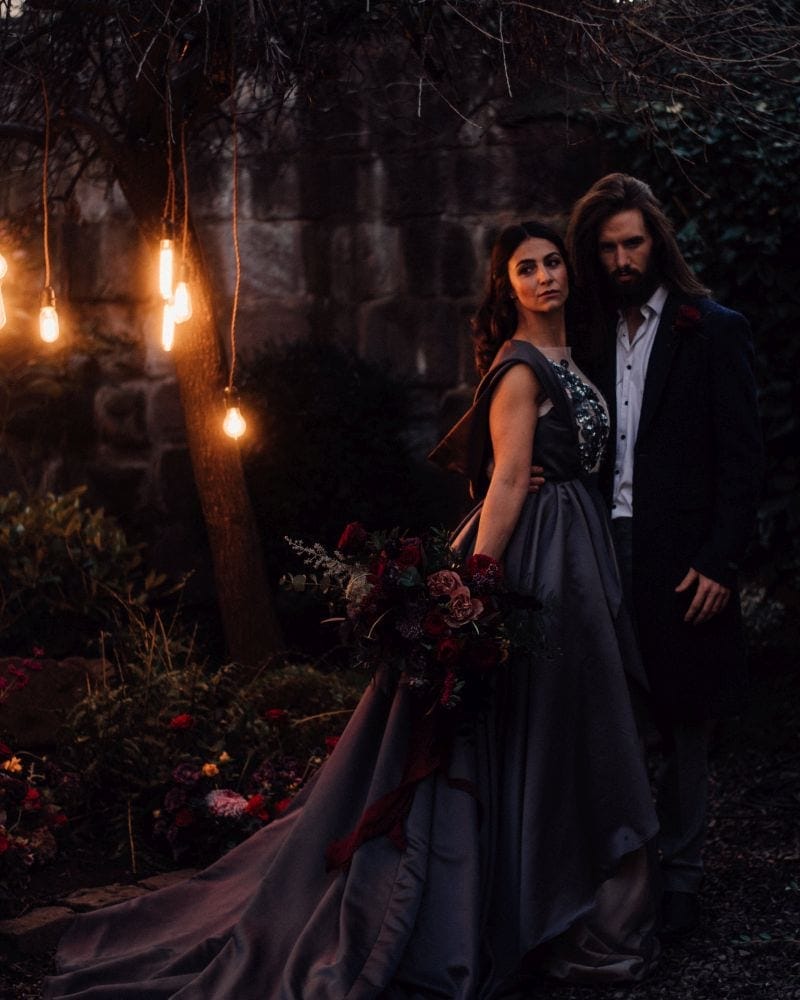
4. Disregarding Appropriate Attire
Winter weddings require careful consideration of attire for both the wedding party and guests.
You need to ensure everyone stays warm and comfortable while still looking stylish. Here’s how to make sure everyone is dressed appropriately for the occasion:
Wedding Party Attire
- Warm Yet Stylish: Opt for long-sleeved gowns for the bride and bridesmaids. Fabrics like velvet and satin not only look elegant but also provide extra warmth. Consider adding faux fur stoles or wraps for an extra layer of coziness and style.
- Layering: Encourage layering to accommodate the transition between indoor and outdoor settings. Bridesmaids can wear thermal leggings under their dresses, and groomsmen can add vests or stylish overcoats that match their suits.
- Footwear: Choose footwear that can handle outdoor conditions. Have the bridal party bring boots for outdoor photos and a more elegant pair of shoes for indoor events. Brides might want to consider elegant, insulated boots for outdoor shoots and have stylish heels for the indoor ceremony and reception.
Guest Attire Recommendations
- Communication: Provide clear attire recommendations to your guests. Include these details on your wedding website or in your invitations. Mention the expected weather conditions and suggest items like warm coats, gloves, scarves, and even hats.
- Layers: Advise guests to dress in layers to easily adjust between indoor and outdoor settings. This helps them stay comfortable regardless of temperature changes.
Accommodating Indoor and Outdoor Changes
- Layering for Flexibility: Both the wedding party and guests should be prepared for moving between indoor and outdoor locations. Layering is key—start with a warm base layer and add fashionable outer layers that can be removed once inside.
- Warm Accessories: Encourage everyone to bring warm accessories like shawls, wraps, or pashminas that can be easily added or removed as needed. Or give them as winter wedding favours.
Outdoor Photo Sessions
- Boots for Photos: Ensure the bridal party has appropriate footwear for outdoor photo sessions. Warm, stylish boots can prevent cold feet and add a charming touch to winter wedding photos.
- Coordinated Outerwear: Choose outerwear that complements the wedding colours and theme. Matching coats or wraps can add a cohesive and elegant look to outdoor photos while keeping everyone warm.
Stylish Yet Functional
- Fashion Meets Function: It’s possible to look stylish and stay warm. Choose attire that incorporates both fashion and functionality, such as long-sleeved dresses, elegant gloves, and chic yet warm outer layers.
- Fabrics and Materials: Utilize materials that are both beautiful and practical. Velvet, wool blends, and lined garments can provide necessary warmth without compromising on style.
By considering these tips, you can ensure that both your wedding party and guests are comfortable and stylish, regardless of the winter weather.
Proper attire planning helps everyone enjoy the day to the fullest and ensures your wedding photos capture the elegance of the season.
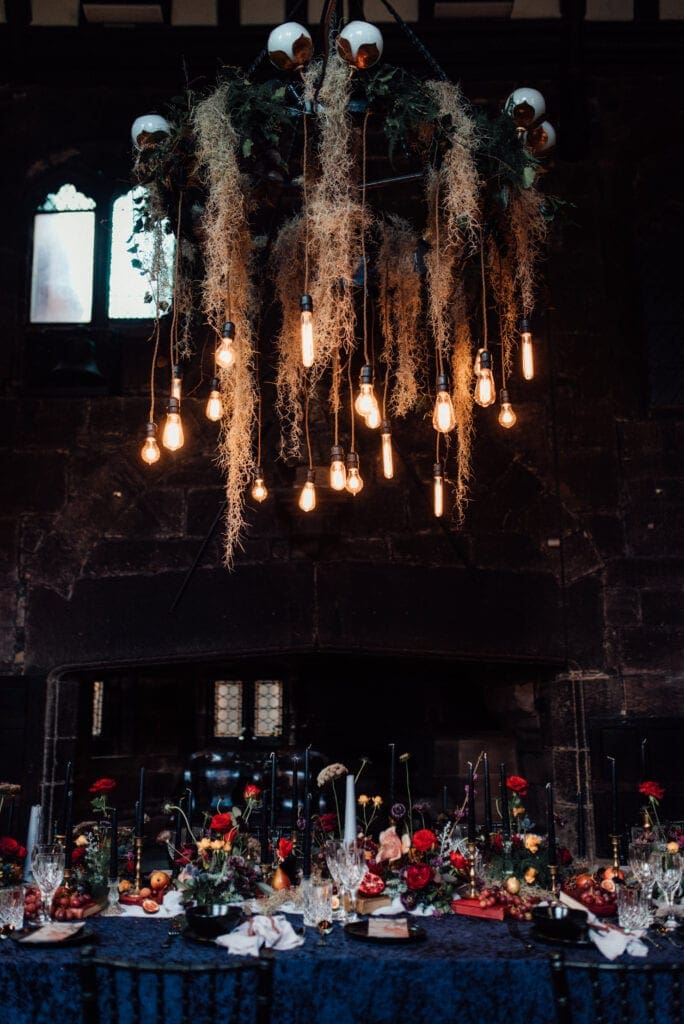
5. Neglecting Décor and Lighting Needs
Winter weddings offer unique décor opportunities, but it’s easy to underestimate the amount needed to create a cozy atmosphere.
Proper lighting is crucial, especially given the early sunsets. Here’s how to ensure your winter wedding is beautifully lit and decorated:
Emphasize Lighting
- Ambient Lighting: Use plenty of ambient lighting to create a warm and inviting atmosphere. Incorporate candles, fairy lights, and lanterns throughout your venue to add a soft, romantic glow.
- Fairy Lights: String fairy lights across ceilings, wrap them around pillars, and weave them through greenery to add a magical touch. They are versatile and can be used both indoors and outdoors.
- Candles: Place candles of varying heights on tables, windowsills, and in lanterns. Consider using battery-operated candles for safety, especially in high-traffic areas.
- Uplighting: Use uplighting to highlight architectural features or focal points like your cake table, sweetheart table, or entrance. This adds depth and drama to your décor.
Seasonal Décor
- Winter Greenery: Incorporate evergreen branches, holly, pinecones, and berries into your decorations. These elements are not only seasonally appropriate but also add a touch of natural beauty.
- Seasonal Flowers: Choose flowers that are in season during winter, such as lilies, orchids, roses, and amaryllis. These can be combined with winter foliage to create stunning arrangements.
- Warm Textures: Use plush fabrics like velvet, wool, and faux fur in your décor. This can include table runners, chair covers, and throw blankets for a cozy feel.
Enhancing Indoor Spaces
- Cozy Corners: Create cozy corners with comfortable seating, warm blankets, and soft lighting. These spaces offer guests a place to relax and enjoy the ambiance.
- Fireplaces: If your venue has a fireplace, make it a focal point. Decorate it with seasonal garlands, candles, and fairy lights to create a warm and inviting atmosphere.
Outdoor Décor Considerations
- Pathway Lighting: Illuminate walkways and outdoor spaces with lanterns, string lights, or ground lights. This ensures safety and adds to the enchanting winter ambiance.
- Heaters and Fire Pits: Use outdoor heaters and fire pits to keep guests warm. Decorate these areas with seasonal touches to make them feel inviting.
Practical Tips
- Lighting Timing: Coordinate with your photographer and venue to ensure lighting is set up in time for key moments and photos. Early sunsets mean you’ll need good lighting even during late afternoon.
- Energy Sources: Ensure you have enough power sources for all your lighting needs. Check with your venue about the availability of electrical outlets and consider renting generators if necessary.
6. Personalized Touches
- Monogram Lighting: Consider using a monogram light to project your initials or a custom design onto a wall or dance floor. This adds a personal and stylish touch to your décor.
- Photo Displays: Use string lights to hang photos of you and your partner. This adds a personal element and serves as a great conversation starter for guests.
By focusing on lighting and thoughtful décor, you can create a warm, inviting, and visually stunning atmosphere for your winter wedding.
Proper lighting is especially important with the early nights, ensuring your celebration remains bright and beautiful well into the evening.
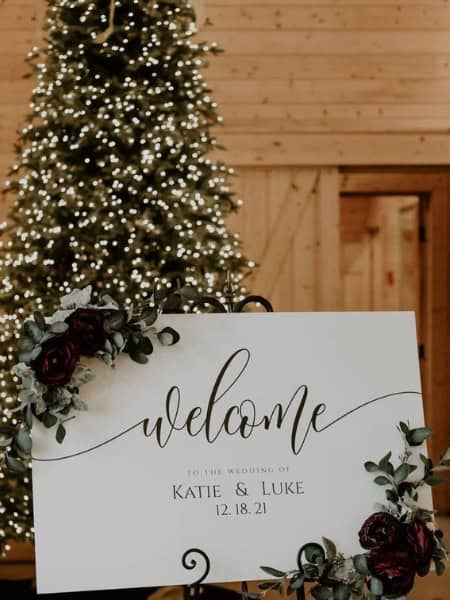
6. Not Considering the Effect of the Holidays
Planning a winter wedding comes with the added complexity of navigating around the holiday season.
The holidays can impact everything from guest availability to vendor scheduling. Here’s how to manage these challenges effectively:
Guest Availability
- Holiday Travel: Many people travel during the holiday season to visit family and friends. This can make it difficult for guests to attend your wedding, especially if they need to travel long distances.
- Competing Events: December is a busy month for holiday parties, New Year’s celebrations, and other events. Sending out save-the-dates well in advance can help ensure your wedding is a priority for your guests.
Higher Costs
- Increased Prices: Travel, accommodation, and even some vendor costs can be higher during the holiday season due to increased demand. Book early to secure better rates and availability.
- Holiday Premiums: Some vendors may charge a premium for working during the holiday season. Be sure to factor this into your budget and confirm all costs up front.
Vendor Availability
- Busy Schedules: Vendors can be booked well in advance for holiday events. It’s crucial to secure your vendors as early as possible to avoid any scheduling conflicts.
- Limited Staffing: Some vendors might have limited staff available during the holidays. Confirm that your chosen vendors have the necessary resources to deliver their services effectively.
Logistics and Delivery
- Shipping Delays: If you’re ordering items online or having custom pieces made, be aware that shipping can be slower during the holidays. Plan for extra time to avoid any last-minute stress.
- Local Services: Local delivery services may also be affected by holiday closures and high demand. Confirm delivery schedules to ensure everything arrives on time.
Accommodation Challenges
- Hotel Availability: Hotels can be fully booked due to holiday travel. Reserve blocks of rooms for your guests as soon as possible to ensure they have a place to stay.
- Price Fluctuations: Accommodation prices can fluctuate during the holiday season. Booking early can help lock in more favorable rates for your guests.
Festive Décor and Themes
- Venue Décor: Many venues will already be decorated for the holidays. This can be a bonus if you enjoy festive décor, but it might clash with your wedding theme. Discuss decoration plans with your venue coordinator to find a balance that works for you.
- Incorporating Holidays: Consider how you might incorporate holiday elements into your wedding décor and menu. This can create a unique and memorable experience for your guests.
Transportation Issues
- Travel Congestion: Airports and highways can be exceptionally busy during the holiday season. Advise your guests to plan their travel carefully and allow extra time for potential delays.
- Local Transport: Ensure that local transportation options, like shuttles and taxis, are readily available for your guests, especially if public transport is running on a holiday schedule.
By anticipating and planning for the challenges presented by the holiday season, you can ensure your winter wedding goes off without a hitch.
This consideration will help make the day enjoyable and stress-free for both you and your guests.
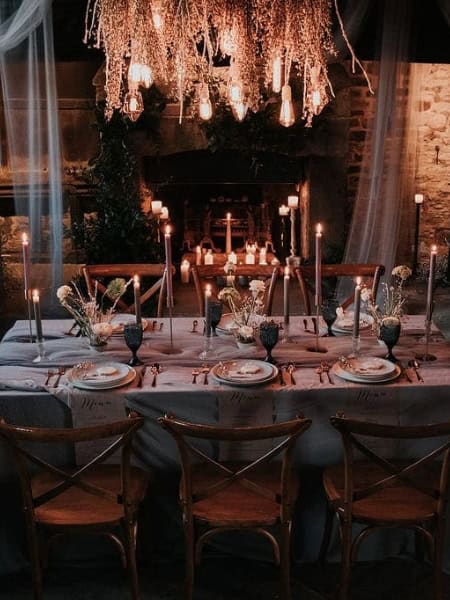
7. Skipping Wedding Insurance
Winter weather can lead to unexpected cancellations or delays, making wedding insurance a crucial investment for peace of mind. I am always shocked by how many people don’t get wedding insurance. It should be first on the list!
Here’s why it’s particularly important for winter weddings and how it can safeguard your big day:
Unpredictable Weather
- Weather Risks: Winter is notorious for severe weather conditions such as snowstorms, ice, and blizzards. These can cause significant disruptions, including venue cancellations, delayed flights, and impassable roads.
- Rescheduling Costs: Wedding insurance can cover the costs associated with rescheduling your wedding due to inclement weather. This includes venue fees, catering, and other non-refundable expenses.
Coverage for Out-of-Control Situations
- Vendor Issues: If a vendor fails to deliver services due to weather-related issues, insurance can cover the additional costs of finding last-minute replacements. This is crucial when suppliers face travel disruptions or equipment damage.
- Travel Delays: Guests traveling from afar might face flight cancellations or delays. Wedding insurance can help cover the costs of rearranging travel plans and accommodations.
Health Considerations
- Guest Health: Winter is also flu season, increasing the likelihood of key participants falling ill. Insurance can cover the costs of postponing the wedding to a later date when everyone can attend safely.
- Bride and Groom Health: If either the bride or groom falls seriously ill and the wedding needs to be postponed, insurance can cover the costs of rescheduling.
Financial Protection
- Non-Refundable Deposits: Many wedding expenses are paid upfront and are non-refundable. Wedding insurance ensures you’re not out of pocket if the worst happens and you need to cancel or postpone.
- Property Damage: Winter conditions can lead to property damage at your venue or to rented equipment. Insurance can cover the costs of repairs or replacements.
Peace of Mind
- Stress Reduction: Knowing that you’re covered for unexpected events can significantly reduce the stress of planning a winter wedding. This allows you to focus on enjoying your special day rather than worrying about potential disasters.
- Comprehensive Coverage: Ensure your policy includes coverage for weather-related disruptions, illness, vendor issues, and property damage. Review the terms carefully and discuss with your insurance provider to understand what is covered.
Practical Steps
- Early Purchase: Buy wedding insurance as soon as you start making significant financial commitments. This ensures you’re covered from the get-go.
- Tailored Policies: Work with an insurance provider to tailor a policy specific to your needs and the risks associated with your winter wedding location.
By taking out wedding insurance, you’re not only protecting your financial investment but also ensuring that your big day can proceed smoothly, no matter what challenges arise.
It’s a small price to pay for the security and peace of mind it provides, making it an essential part of your winter wedding planning.





